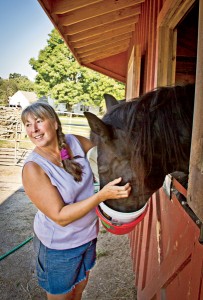A Home for Retired Horses
We pay homage to farmers and others in agriculture who give ’til it helps. As she moves through the fields and stables at Mitchell Farm Equine Retirement near Salem, Conn., Dee Doolittle is telling stories. The director of the facility...
A Home for Retired Horses
We pay homage to farmers and others in agriculture who give ’til it helps. As she moves through the fields and stables at Mitchell Farm Equine Retirement near Salem, Conn., Dee Doolittle is telling stories. The director of the facility...We pay homage to farmers and others in agriculture who give ’til it helps.
As she moves through the fields and stables at Mitchell Farm Equine Retirement near Salem, Conn., Dee Doolittle is telling stories. The director of the facility knows each of the 29 permanent residents at the facility. “That’s Tommy,” she says, pointing to an aging show horse who was shipped from Ireland to the U.S. as a youngster and “never matched personalities with his trainer.” Josie, the veteran mare who has been at Mitchell Farm the longest, “helps teach new arrivals how to be a horse again.”
And R2, the latest addition and a former Grand Prix jumper, had anxiety attacks when he arrived. “He paced, twirled in his stall, sweated,” says Dee. “He screamed. Just like a person.” But no more.
As a former vet technician and barn manager for a therapeutic riding farm, Dee saw a gap—more like a black hole, she says—in the care of horses who were at the end of their careers but not their lives. “I thought there should be a place for old horses and horses with infirmities—a sanctuary,” she says.
Working horses, especially on the show circuit, are likely to become colicky or develop ulcers. Their jobs are stressful. “And they never learn to just be a horse,” says Dee. They learn everything they know from humans, not other horses. At Mitchell Farm, horses like R2 can finally relax. “We’re not going to ask him to do anything,” says Dee. “All he has to do is eat.”
Owners who want their horses to live out their lives at Mitchell Farm actually sign papers to surrender the animal. Though they pay a one-time fee—roughly the cost of one year’s care—Dee says Mitchell Farm survives on grants and donations, along with fundraising events on the farm, and the hard work and input of about 30 volunteers.
Still, she says, it’s not always enough. At one time, more than 70 animals were on the waiting list, and the farm is over capacity now. “We have our fingers in the dike,” says Dee. “It’s a scary world out there for horses.”
Watch the video of Doolittle share a moment with R2, one her retired “residents.”
Share stories of charitable works in your community with us.




